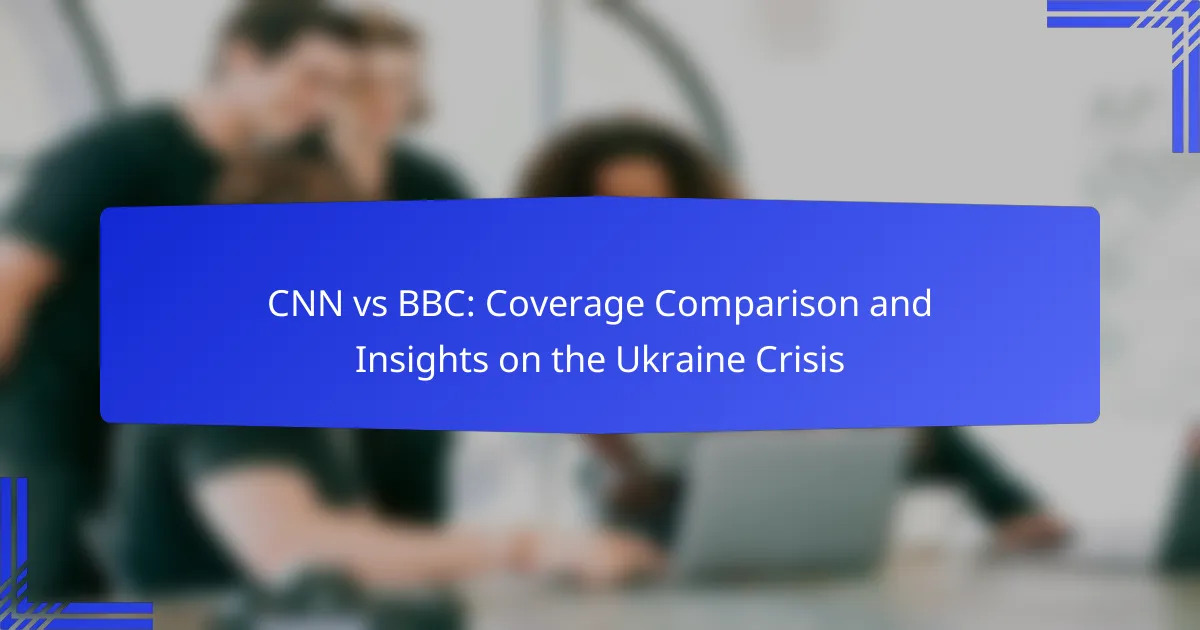The coverage of the Ukraine crisis by CNN and BBC reveals distinct journalistic approaches that cater to different audience needs. CNN prioritizes breaking news and personal narratives, aiming to engage viewers emotionally, while BBC emphasizes impartiality and in-depth analysis, providing a broader context of the media coverage of international conflicts. Together, these perspectives offer a comprehensive understanding of the ongoing conflict.
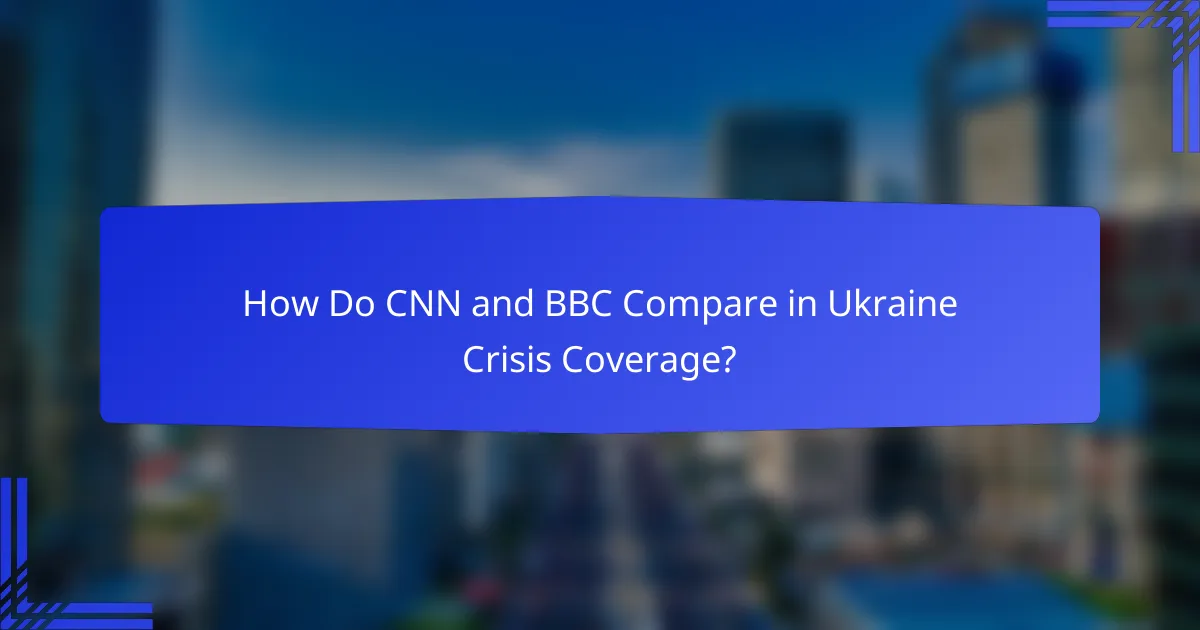
How Do CNN and BBC Compare in Ukraine Crisis Coverage?
CNN and BBC provide distinct approaches to covering the Ukraine crisis, with differences in style, depth, and audience engagement. While CNN often emphasizes breaking news and live updates, BBC tends to focus on comprehensive analysis and context-driven reporting.
Key differences in reporting style
CNN’s reporting style is characterized by a fast-paced, urgent tone, often prioritizing immediate developments and live coverage. This approach appeals to viewers seeking real-time updates on the unfolding situation in Ukraine.
In contrast, BBC’s style is more measured and analytical, providing in-depth reports that include historical context and expert opinions. This method caters to an audience looking for a deeper understanding of the crisis and its implications.
Coverage depth and breadth
CNN typically covers a wide range of topics related to the Ukraine crisis, including military developments, humanitarian issues, and international responses, often through short segments. This breadth allows for quick updates but may sacrifice depth in some areas.
BBC, on the other hand, often delves deeper into specific aspects of the crisis, offering detailed reports and documentaries that explore the political, social, and economic ramifications. This depth provides viewers with a more comprehensive picture of the situation.
Audience engagement metrics
Audience engagement for CNN tends to be high during breaking news events, with significant spikes in viewership during live broadcasts. This engagement is often driven by the immediacy of their coverage and the use of social media to disseminate updates quickly.
BBC, while also experiencing spikes in viewership, often sees sustained engagement through its in-depth articles and analyses. Their audience may prefer to engage with content that offers more context and background, leading to longer reading times on their website.
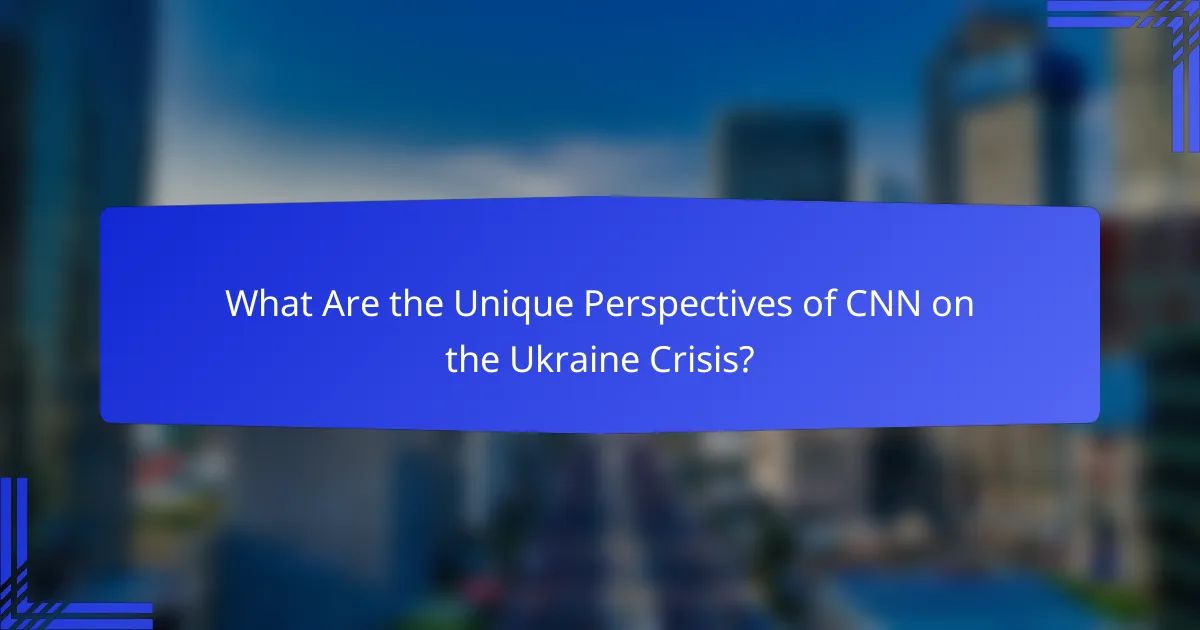
What Are the Unique Perspectives of CNN on the Ukraine Crisis?
CNN’s coverage of the Ukraine crisis emphasizes human stories and the personal impact of the conflict, providing viewers with a relatable understanding of the situation. This approach aims to connect audiences emotionally while also offering insights into the broader political ramifications of the war.
Focus on human interest stories
CNN often highlights individual experiences and narratives from those affected by the Ukraine crisis, showcasing the resilience and struggles of civilians. By featuring interviews with refugees, families, and local activists, the network paints a vivid picture of the human cost of the conflict.
This focus on personal stories helps to humanize the statistics and political discussions surrounding the war, making the crisis more accessible to viewers. For example, CNN may cover a family’s journey to safety or a volunteer’s efforts to provide aid, illustrating the profound emotional and social impacts of the war.
Analysis of political implications
CNN provides in-depth analysis of the political dynamics at play in the Ukraine crisis, examining the actions of various stakeholders, including the Ukrainian government, Russia, and international allies. This analysis often includes expert opinions and commentary, helping viewers understand the complexities of the geopolitical landscape.
The network discusses the implications of military aid, sanctions, and diplomatic efforts, offering context on how these factors influence the conflict’s trajectory. By breaking down these political elements, CNN enables audiences to grasp the broader significance of the events unfolding in Ukraine.
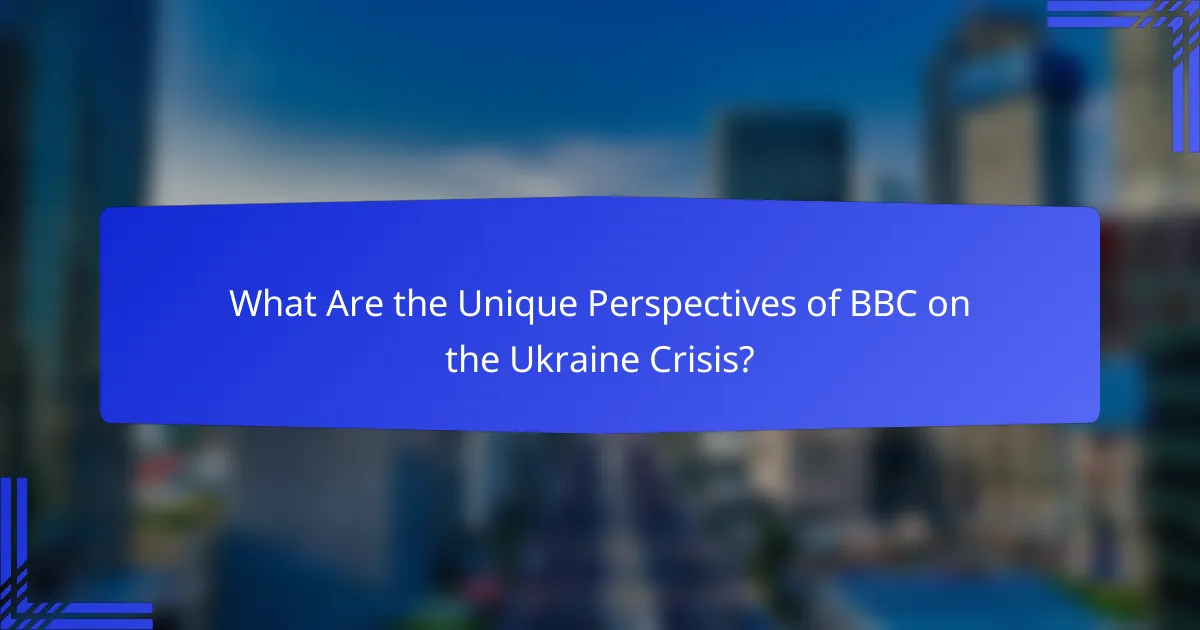
What Are the Unique Perspectives of BBC on the Ukraine Crisis?
The BBC offers a distinctive perspective on the Ukraine crisis, focusing on impartiality and comprehensive analysis. Their reporting emphasizes factual accuracy while providing a broader context of the geopolitical implications of the conflict.
Emphasis on factual reporting
The BBC prioritizes factual reporting, ensuring that their coverage is grounded in verified information. This approach helps to minimize misinformation and provides audiences with a reliable understanding of the situation in Ukraine.
By utilizing a range of sources, including on-the-ground reporters and expert analyses, the BBC maintains a commitment to presenting multiple viewpoints. This thoroughness allows for a more nuanced portrayal of the crisis, which is crucial for informed public discourse.
Global context in coverage
The BBC situates the Ukraine crisis within a global framework, highlighting its implications for international relations and security. This perspective helps audiences grasp how the conflict affects not just Ukraine, but also Europe and beyond.
For instance, the BBC often discusses the responses of NATO and the European Union, as well as the economic impacts on global markets. By framing the crisis in this way, the BBC encourages viewers to consider the broader ramifications of the conflict.
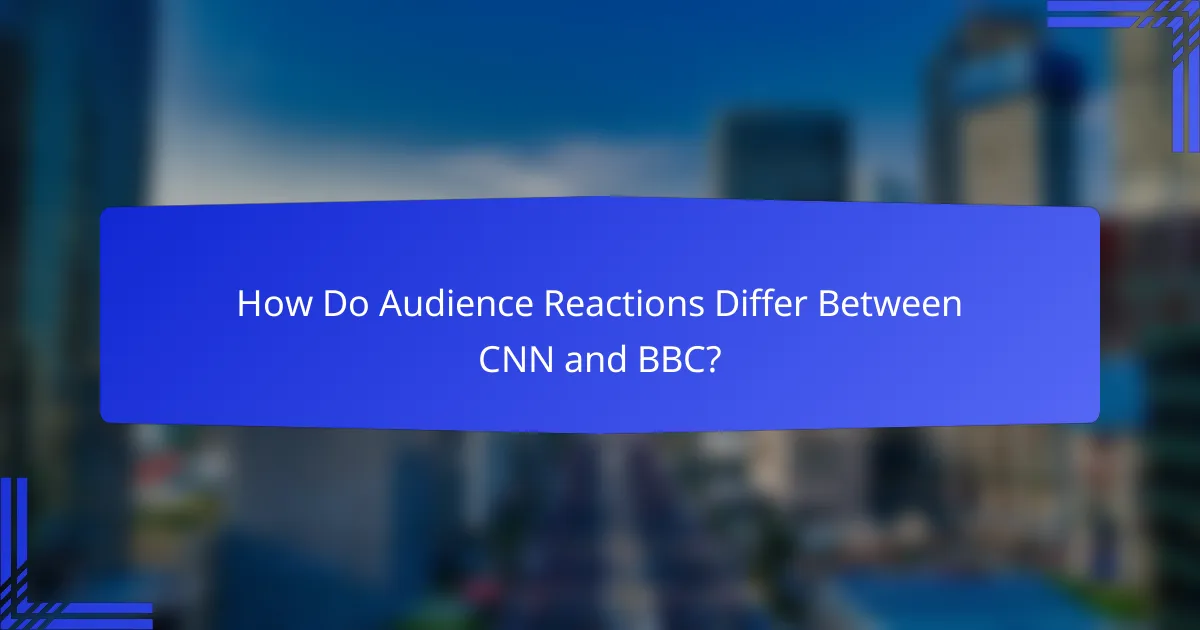
How Do Audience Reactions Differ Between CNN and BBC?
Audience reactions to CNN and BBC coverage of the Ukraine crisis show notable differences in engagement and sentiment. CNN tends to attract a younger, more diverse audience, while BBC appeals to a broader demographic with a focus on international viewers.
Viewer demographics and preferences
CNN’s audience primarily consists of younger adults, particularly in the United States, who prefer fast-paced, visually engaging content. In contrast, BBC’s viewers are often older and more globally minded, valuing in-depth analysis and comprehensive reporting.
Preferences also vary; CNN’s audience favors breaking news updates and interactive formats, while BBC viewers appreciate detailed narratives and context that explain the complexities of the Ukraine crisis. This divergence shapes how each network tailors its coverage to meet audience expectations.
Social media engagement comparisons
Social media engagement for CNN is typically higher, with a strong presence on platforms like Twitter and Instagram, where they share real-time updates and visuals. This strategy resonates well with their younger audience, driving rapid shares and discussions.
Conversely, BBC engages its audience through more traditional platforms, focusing on Facebook and LinkedIn, where they share articles and analyses. While their engagement may be lower in volume, it often leads to more meaningful discussions among users interested in global affairs.
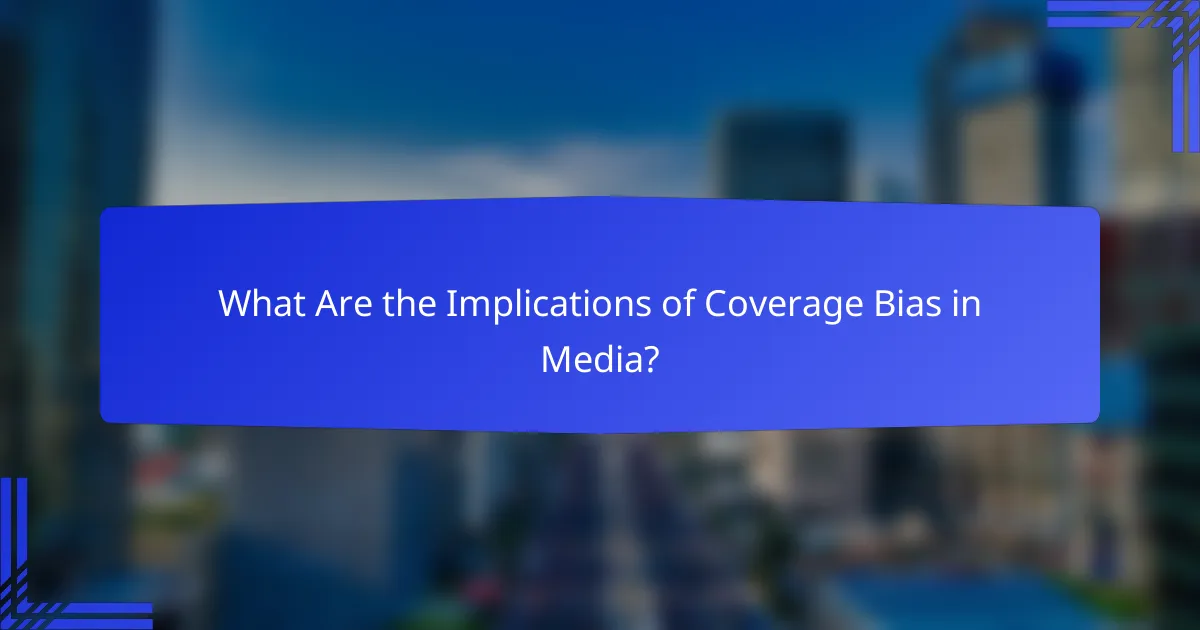
What Are the Implications of Coverage Bias in Media?
Coverage bias in media can significantly shape public understanding and response to events, such as the Ukraine crisis. It often leads to skewed perceptions, influencing how audiences interpret facts and form opinions based on selective reporting.
Impact on public perception
Media coverage plays a crucial role in shaping public perception, especially during crises. When outlets like CNN or BBC emphasize certain narratives or omit key facts, it can create a distorted view of the situation. For instance, portraying one side as entirely victimized while demonizing the other can lead to polarized opinions among viewers.
Moreover, the framing of news stories can affect emotional responses. If coverage focuses on human interest stories, audiences may feel more empathy towards affected individuals, while a focus on military strategy may lead to a more analytical but detached response. This variance can influence public support for actions taken by governments or organizations.
Influence on policy decisions
Coverage bias can directly impact policy decisions by shaping the political landscape. Policymakers often rely on media narratives to gauge public sentiment and adjust their strategies accordingly. If a media outlet consistently highlights humanitarian crises, for example, it may pressure governments to take action, such as increasing aid or imposing sanctions.
Additionally, biased reporting can lead to misinformed decisions. If policymakers base their actions on skewed media portrayals, they may overlook critical aspects of a situation, resulting in ineffective or harmful policies. It is essential for decision-makers to seek diverse sources of information to mitigate this risk and ensure well-rounded approaches to complex issues like the Ukraine crisis.
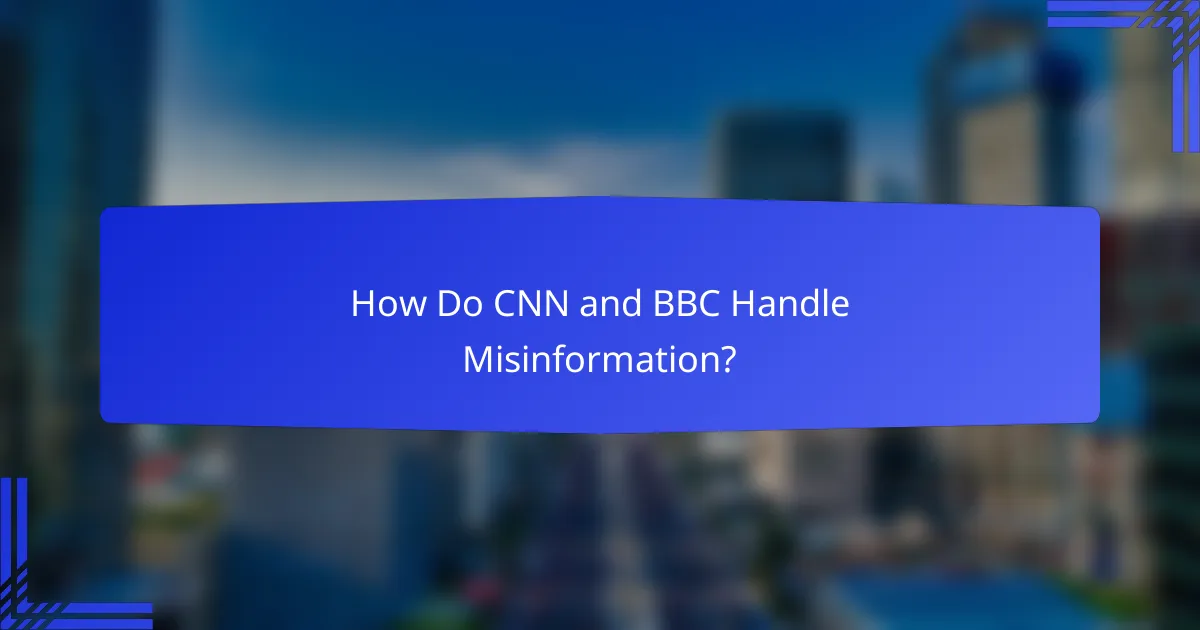
How Do CNN and BBC Handle Misinformation?
CNN and BBC both implement rigorous strategies to combat misinformation, focusing on fact-checking and transparency. Their approaches differ in execution, reflecting their unique editorial standards and audience expectations.
Fact-checking processes
CNN utilizes a dedicated fact-checking team that reviews claims made in its reporting, especially during breaking news events like the Ukraine crisis. This team cross-references information with credible sources, ensuring accuracy before publication.
BBC employs a similar strategy, emphasizing a multi-layered fact-checking process. Their journalists are trained to verify information through various channels, including official statements and expert opinions, which helps maintain credibility in their coverage.
Transparency in reporting
CNN promotes transparency by providing context for its sources, often linking to original documents or statements. This practice allows viewers to understand the basis of their reporting and evaluate the reliability of the information presented.
BBC enhances transparency by clearly labeling its sources and distinguishing between verified news and unverified claims. They also regularly update their reports as new information emerges, which is crucial in fast-evolving situations like the Ukraine crisis.
